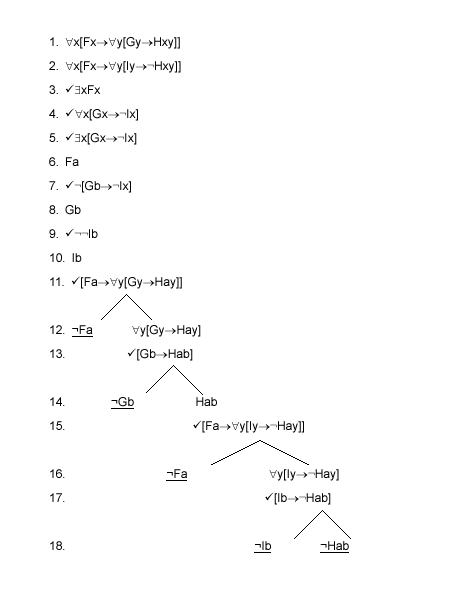| ||||||||||||||||||||||||||||||
Proof of a syntactic sequent: example
We will prove the following sequent:
"x[Fx®"y[Gy®Hxy]], "x[Fx®"y[Iy®¬Hxy]], $xFx |- "x[Gx®¬Ix]
The counterexample set is
{"x[Fx®"y[Gy®Hxy]], "x[Fx®"y[Iy®¬Hxy]], $xFx, ¬"x[Gx®¬Ix]}
In constructing the tableau we will put in ticks (but remember that they are entirely optional) and line numbers (for ease of reference).
|
|
Comments:
Lines 1-4: these are the members of the counterexample set.
Line 5: from line 4 by the ¬"xj rule. We could have done the $xj rule on line 3 instead; we can't however apply the "xj rule to lines 1 and 2 until we have some designators in the branch.
Line 6: from line 3 by the $xj rule.
Line 7: from line 5 by the $xj rule. (We could have applied the "xj rule to line 1 or 2; but it is sensible usually to make $xj applications first, since they supply new designators from which we can make a choice when using the "xj rule.)
Lines 8-10: We might as well apply these propositional rules while we are about it to simplify things.
Line 11: Application of the "xj rule to line 1. It looks as if using "a" may help, since we have "Fa" in line 6.
Line 12: Using "a" in line 11 did help. Notice that it meant that the left branch closed, and in effect we got ""y[Gy®Hay]" from lines 6 and 11. In general, when we have "j" in one line and "[j®y]" in another we can get "y", because when we apply the [j®y] rule the left branch closes.
Line 13: this time it looks sensible to use "b", because we have "Gb" in line 8.
Line 14: and we get Hab.
Line 15: We apply the "xj rule to line 2: using "a" seems sensible again, given "Fa" in line 6.
Line 16: and we get ""y[Iy®¬Hay]"
Line 17: This time using "b" is a good idea, because of the "Ib" in line 10.
Line 18: and we get "¬Hab"; and the right branch closes as well. Actually we notice that the left hand branch would have closed because of the presence of "¬¬Ib" in line 9: so we didn't actually need line 10 at all.
The tableau closes. So the sequent is correct.
| Print this page |
